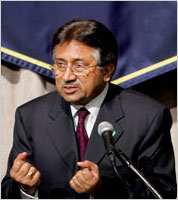After weeks of disputes over his candidacy and indeed the meaning of a seldom used clause in the constitution of Pakistan, former General Pervez Musharraf, who headed a junta in the nation from 1999 until the last elections, will be allowed to run for parliament.
 Musharraf faces criminal charges for myriad offenses in Pakistan, including the coup that brought him to power and the 2007 assassination of Benazir Bhutto. He has spent most of the past several years in exile, and his return only came after an agreement to pre-pay bail for his arrest the moment he arrived back in the nation.
Musharraf faces criminal charges for myriad offenses in Pakistan, including the coup that brought him to power and the 2007 assassination of Benazir Bhutto. He has spent most of the past several years in exile, and his return only came after an agreement to pre-pay bail for his arrest the moment he arrived back in the nation.
His candidacy had been rejected in multiple districts before Chitral, a rural district near the Afghan border. Officials say that since he was not convicted yet they couldn’t disqualify him.
That didn’t stop other districts, however, which relied on a constitutional ban on running for office if one is not a “good Muslim of integrity and honesty,” citing his orders for the military to attack mosques during his reign as proof that he was not one.
A Musharraf victory could set the stage for another round of battles over the legality of a law he imposed right before his ouster, which declared elected officials immune from criminal charges. The Pakistani Supreme Court has repeatedly struck the rule down, and even ordered the arrests of multiple prime ministers during the PPP’s term, but PPP officials have ignored the rulings and insisted that the law still applies.


